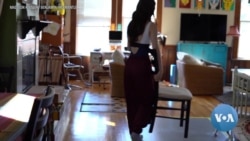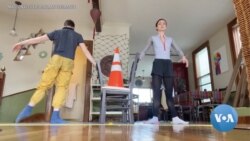Madison Keesler clears furniture and pets from the living room, while Benjamin Freemantle chomps on a banana topped with peanut butter. The two, who live together, are preparing to dance with dozens of other members of the San Francisco Ballet company currently sequestered throughout the city and around the world.
Since shelter-in-place rules went into effect three weeks ago, the company has met virtually - by video chat - for its daily class. Once used mostly for corporate meetings, video conferences have suddenly become the lifeline connecting isolated friends, co-workers, and family members.
“A ballet company in particular, the people you work with and especially the dancers, they become like family,” says Keesler who is a soloist with the company. The abrupt cancellation of performances and loss of the daily ritual and camaraderie has been challenging.
“So at least this offers waking up, turning on your computer and you still get to chat with them and see them a little bit,” she says.
The virtual classes, which the company has been sharing publicly, have also been a comfort to thousands of fans, deprived of a performance season but now given access to an intimate view of dancers at work in kitchens, bedrooms and hallways.
“People really want to know who the dancers are, and you just don’t get to know that on stage,” says Freemantle, a principal dancer with the company. “So even just this little glimpse into your living room or something where, I think you get to see a little bit of who that person is.”
“You also get to see who are the real ballet nerds, with the ballet barre bolted into the wall,” chuckles Freemantle, who is improvising with kitchen chairs for the moment.
Amateurs are also joining in the class. Writes one fan, “Dream come true to see this and do a class at home with the SF Ballet! Be still my heart.”
Support of old comrades
Old friends are also connecting in new ways. Lexine Alpert is in touch every week with a group of women activists she’s known since the early 80’s when they joined forces in San Francisco as the “Nuclear Beauty Parlor.”
Now dispersed around the country, the group normally gathers every two years. But since physical distancing began, they’ve felt compelled to meet each week using Zoom.
Ten women appeared for a recent call, many with cocktails in hand.
“It was wonderful,” says Alpert. “Each of us spontaneously spoke about what we’re going through with this virus. It was a really nice to hear everybody's take on how they're handling the situation.”
Alpert, a retired social worker, also meets virtually with her book club and refugee support organizations she is affiliated with.
“It’s just a way to stay connected to one another,” she says.
Coming soon to a laptop near you
Louie Schwartzberg had spent months generating buzz and cultivating an audience for his documentary film “Fantastic Fungi,” selling out theaters in the U.S. and Europe for the planned release date of March 26.
When theaters were forced to close, he had to quickly come up with a new plan.
“We pivoted when we heard about this pandemic because people can no longer come to the theater and we really wanted to continue this feeling of connection,” says Schwartzberg.
The solution was a virtual release: people could enjoy the film at home and watch live Q&A sessions with the film’s panel of experts.
“It was amazing. We probably got 20,000 attendees and participation from 101 countries,” says Schwartzberg.
Known for his dazzling time-lapse nature photography, Schwartzberg has had a camera clicking away somewhere every day for the past 30 years and knows a lot about waiting patiently.
Of the forced sequestration he has this to say, “Maybe there is a little bit more time to stare at a certain flower in the garden. Maybe there's a little bit more time to think about your friends and your family.”
Ten years of closely observing mushrooms for his current film has also given Schwartzberg a perspective on surviving natural threats, “One of the messages in the movie, which I didn't realize until I finished the movie, is that individuals with a community survive better than individuals alone, that ecosystems flourish with this connectivity.”
And during the pandemic, technology is playing a vital role in sustaining those communities.







